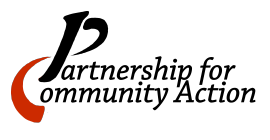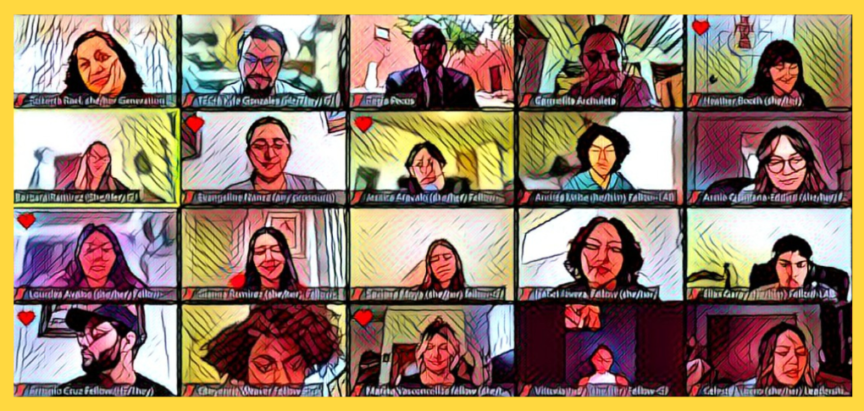Partnership for Community Action, along with many other organizational partners and community leaders, partnered with Generation Justice on their Leaders for Change Fellowship. The program brings fellows ages 14 to 24 together with community organizations to give young individuals leadership roles—all through the lens of positive youth development.
The youth leaders serve at a community-based organization and work on topic-based projects specific to the social priorities within their community. The organizers work alongside each other and conduct peer-to-peer learning and mentoring, and critical analysis of their work. The fellowship allows young leaders to build skills, confidence, ability, and forge new professional connections. Young leaders learn to understand history, power structures and dynamics—with their voices at the center.
Throughout the summer, they focused on the two priorities of this year’s program: shifting the narrative around public health, including the importance of COVID-19 vaccines, and dispelling misinformation about the virus.
Executive director of Generation Justice, Roberta Rael shares the history and impact of the program:
How did Generation Justice begin?
We started out being the KUNM Youth Radio Project in 2005. Four years later we became partners with KUNM and community based. Youth in the project participated in the renaming and rebranding of Generation Justice. The organization has since evolved into a broader mission using multimedia format that uses a positive youth development approach to facilitate social change, leadership development, and media justice.
What is the Leaders for Change program?
In 2019, GJ launched the Narrative Shift Partnership (NSP).The Leaders for Change program evolved from this partnership and a desire to shift the narrative about youth and their engagement in community. Typically, mainstream media advances the narrative that young people are unskilled or apathetic. However, that is not the experience of young people. Young individuals care very deeply about their community and are hungry for experience and connection — they want to build a deeper understanding of the world around them.
Leaders for Change was designed with input from fellow community partners like Partnership for Community Action. Generation Justice raised the funding to support the program and met with fellow policy and justice organizations to build the fellowship structure, application process, and recruitment plan.
What kind of learning or work did the participants engage in?
This year was the first year of the program and it was facilitated virtually. The fellows and community experts spanned from Española to Albuquerque to Las Cruces, and also included Indigenous leaders from Pueblos and Native nations.
The fellowship was structured around 2 aspects:
- Vaccine equity effort
This focus was centered around the importance for young people to understand dis/misinformation, and to build media literacy around the narrative of COVID-19. Young leaders were trained in designing graphics and building messaging. Together they created the vaccine equity campaign Protect Your Hood NM. This youth-curated, multi-media campaign reflects the depth of learning through the program.
- Understanding public health and engaging in policy
Using a positive youth development framework, participants in the Leaders for Change program also learned about the policy and history of public health in New Mexico through a racial equity lens. They identified the most important topics relevant to public health like climate change, education, economic injustice, mental health, and reproductive justice and spoke to experts on each subject.
Not only did they meet with experts, they also brought their own expertise and life experiences into the conversations. This feature of the program offers a space to speak and learn about the most pressing issues that their generation faces, including questions that other generations haven’t had to face, like climate change.
What is positive youth development?
A positive youth development framework insists that we center young people and provide them with learning opportunities in spaces and times that work best for their development. The framework doesn’t force young people to compartmentalize their activities, rather it makes space for them to develop their whole self. Within this positive lens is the belief that every person has a real contribution to make in society and is capable of being leaders in New Mexico.
What does the program teach that isn’t usually found in schools?
Throughout the program, many of the leaders reflected that “they learned things they would have never learned in school.” Through building a multimedia narrative shift campaign, fellows learned about the principles of messaging, how the public emotionally responds to particular images and words, and learned about how to identify disinformation.
Not only that, they heard from Indigenous leaders, learned more about New Mexico history, and social determinants of health—all of which are not topics they would not normally cover in their school curriculum
How will this program help change New Mexico for the better?
The fellows of this program develop critical thinking, community organizing and extended media literacy skills, and eventually develop the power to shift the public narrative around the topics that most impact their communities. This fellowship is an innovative program because it is intergenerational work, combined with equity, racial justice, and the positive youth development framework.
So often I hear folks say ‘it’s up to the youth now’ – that’s a damaging narrative, what an immense, unfair responsibility to lay on their shoulders, It’s going to take every single one of us for the rest of our lives to make change. We have to be contributing to that change so that the children of the children of these young fellows can have quality lives.


